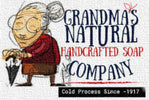From making the skin clean, smooth, and glowing to keeping dermal concerns at bay
Picking the right soap can offer you a multitude of benefits. But how do you select the best one for your skin type?

Soaps can vary depending on their chemical formulation and effects on the skin. Thus, you should understand your skin type and need to find out the most suitable one.
How do Soaps Work?
The primary purpose of soaps and cleansers is to remove dirt, sweat, and oils from your skin. This happens with the use of surfactants that surround oil and dirt, dissolve them, and make it easier for water to wash them away. They also help in exfoliating your skin by removing dead cells from the outermost layer of the skin.
The exposed areas in your body come in contact with dirt, and grime every day and the covered areas get dirty due to constant sweating and moisture. Your skin secretes a natural oil called sebum which mixes with the dirt on your skin, making it difficult to remove from your skin's surface. Using water merely helps in deep cleansing your skin. A suitable soap works great in thoroughly cleansing it.

A soap molecule has both salt and fat. The salty ends attract water, and the fatty ends attract dirt and oil. When you apply soap on your skin with water, the molecules break up the bacteria, germs, and dirt on your skin by forming a circle around each of them. These tiny soap circles around the bacteria and dirt are called micelles. The dirt and germs dislodge from your skin’s surface as soon as micelles are formed. The oil molecules of your skin get washed away when they are surrounded by soap.
“Most soap-based cleansers are about 9-10 on the pH scale and that is why they disturb the neutrality of the skin and damage it right to the cellular level, leading to altered NMF, TWEL (transepidermal water loss). On the other hand, soap-free cleansers have a pH of around 5.5 - 6.5, which helps in maintaining the neutrality of the skin as they have the perfect balance of acids and bases as required by the skin.”

How To Choose The Best Type Of Soap For Your Skin?
A. Normal Skin
Normal skin indicates that your skin is neither too oily nor too dry. Thus, your soap needs to be as neutral as your skin. Don’t go for a soap that is made for dry skin or oily skin. Using the wrong soap can clog your skin pores or make your skin extremely dry. It’s better to look for a soap that is gentle and maintains your skin pH balance. You can go for herbal soaps.
B. Oily Skin
People with oily skin have excess sebum production. Such skin types are more prone to acne breakouts. Make sure to wash your face frequently and avoid using strong soaps. Look for ingredients like salicylic acid, benzoyl peroxide, tea tree oil aloe vera, oatmeal, sea salt, etc. These are gentle on the skin and help to remove excess oil from your skin. Also, make sure your soap is non-comedogenic.
C. Dry Skin
Lower sebum production leads to dry skin. People with dry skin often have itchiness, flaky skin, dry patches, etc. That is why glycerin, cocoa butter, coconut oil shea butter, olive oil, jojoba oil, and aloe vera are the best ingredients to look for in your soap. These ingredients are enriched with moisturizing properties.
D. Sensitive Skin
Sensitive skin is more likely to encounter skin irritation and allergic reactions. Therefore, you should choose gentle and soothing formulations. Your soap should not have artificial fragrances, alcohol and sulfates. Go for a soap that has natural ingredients and would not cause any harm to your skin.
E. Combination Skin
Combination skin has both dry and oily properties. If you have such a skin type, avoid soaps made specifically for oily or dry skin. Glycerin soaps can be a good choice for combination skin.
Not all soaps are created equal. Did you know, for example, that so-called "cleansing" soaps can be the most damaging to your skin? Or that certain "old-fashioned" soaps have properties far superior to that of higher-priced brands?
Soaps can vary significantly, both in terms of their chemical makeup and the clinical effects they have on your skin. By knowing what to look for you can find the bar soap best suited to your individual skincare needs.

Cold Process – When someone refers to Grandma’s homemade lye soap, this is the process she would have used. Fats and oils are heated to make a liquid blend. A lye solution is added to the fats, and no additional heat is applied during the mixing and saponification process. The block of soap firms up after a day or two, and it is cut into individual bars. It is safe to use after a few days, but is soft and contains excess moisture. The soap is left to dry, or cure, for up to 6 weeks. The additional drying allows water to evaporate , resulting in a proper bar of soap.
Are you a fan of cold-processed soap? What kind of soap do you use?



 What makes Natural Handcrafted Soap different from regular soap?
What makes Natural Handcrafted Soap different from regular soap?
0 comments